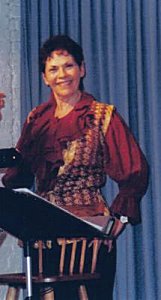 |
Anne Fielding |
|
How Does a
Wife
Interfere with Her Own Happiness? Yet, throughout history, a wife—in subtle and not-so-subtle ways—has tried to dismiss the outside world and make a private world with her husband as an accessory. This “contemptuous exclusion” of reality is the chief way a woman interferes with her being at ease under her own skin, having that “dynamic tranquility,” which Aesthetic Realism describes as happiness, because she’s going against her deepest desire—to be, as Mr. Siegel explained, “in the most accurate and romantic relation with the world possible for oneself.” A great happiness of my life is to teach, with my colleagues in the consultation trio There Are Wives, what we’ve learned to other wives. We’ve seen year after year that when a woman comes to know what in herself has gotten in the way of what she hopes for, that she wants something much grander than making a separate universe she can own and run—her marriage takes on a new life, and a happy direction. I’ll speak about one such woman, ELiza Meadows of Connecticut, who told us in her first consultation that though things were outwardly comfortable in her marriage, she was not happy and felt “very, very blah.” I’ll also give instances from a book published in 2005 by Joan Didion, titled The Year of Magical Thinking. Ms. Didion is the well-known author of five novels and seven books of non-fiction. Her current memoir, which caused a stir and was nominated for a Pulitzer Prize, and received tells about the depression she went through after the sudden death of her husband, the writer John Gregory Dunne. She was driven by the feeling—which she herself says was not sane, in fact was “pathological”—that her husband would return, and that she could be the means of this if she did certain things and avoided others. For example, she writes that on the night he died, she refused to have anyone stay with her, because: ”I needed to be alone so he could come back. This was the beginning of my year of magical thinking.” As a widow myself, I know she had cause for great grief, and I have sympathy for her. Meanwhile, I believe the chief cause of her desolation—which none of the critics who praised her book understood—didn’t begin with his dying, but with the ordinary contempt she had built up during her life and the many years they lived together. Two questions central to how a wife interferes with her own happiness are: 1. Is she using her marriage to feel, as Eli Siegel writes in the chapter “Love and Reality,” “closely one with things as a whole,” or to maintain a separation from the world including her husband? And 2. How much reality does she grant her husband in an everyday way, even as he’s there, perhaps in the next room? In an issue of the journal The Right of Aesthetic Realism to Be Known, Ellen Reiss wrote: You can be married to a person for 70 years and still not see that person as fully real. In fact, a representative wife does not give her husband a complete life in his own right. She sees him as an adjunct to herself, a supporting player in her drama, is principally interested in how he is as to her—not how he sees the world in all its fullness. 1. A Husband Stands for Reality
A wife, hoping to be
happy, needs
to know that in being close to her husband, she’s trying to care for
the world
itself. This has particulars, and in
the lesson I quoted earlier, days before Sheldon and I took the
marriage vows,
we were learning what that means. The week before we had quarreled about our wedding plans which I was in a whirl about and thought Sheldon took too much in his stride. Here I was a few days before wedded bliss and I was jumpy and irritated. In the lesson, I told Mr. Siegel “I feel Sheldon is inconsiderate, doesn’t want to know what I feel, doesn’t understand me, and takes me for granted.” As you can see, my objection was all in terms of how he was as to me, my personal drama, and I wasn’t at all interested in how Sheldon might be affected by taking the big step of marriage. “Do you feel flighty or solid now?” Mr. Siegel asked me. I said, “Flighty,” and that all the details of the wedding were simply too much for me. “Do you think your sense of reality could be better?” Mr. Siegel asked. “Yes,” I said, but wasn’t sure how. He explained: The
sense of reality becomes a
sense of volume—a desire to embrace and have to do with all of it. Do
you
believe in volume? Do you know that
when you marry, you marry volume?. How
you want to see [each other] is a phase of how you want to see what’s
different
from yourself. It’s a philosophic
problem. In marriage, there’s a
certain square acceptance of the density of another. The other
way is to be tangential. Mr. Siegel was giving an outline for the happiness of any two people when he said: “In marriage there’s an idea that ‘If I accept the reality of you, I’ll be more real myself.” The reality of a person, I learned, is how the world’s opposites are in him—and this means that marriage is a chance to know and feel honestly close to the big, various, interesting world itself, and to see it as a friend. That is what happened to me. |